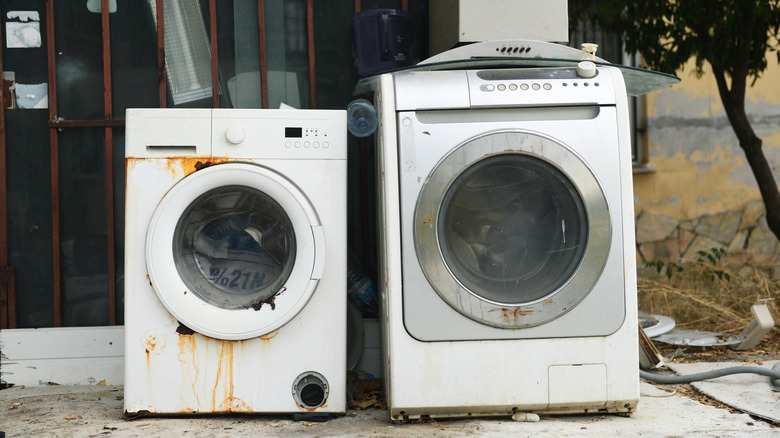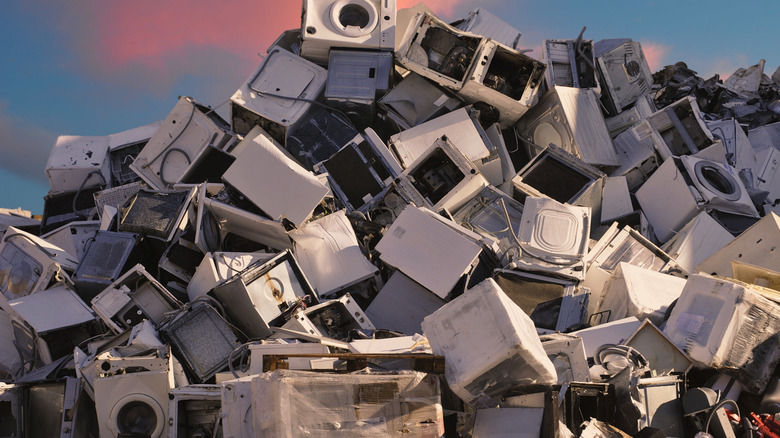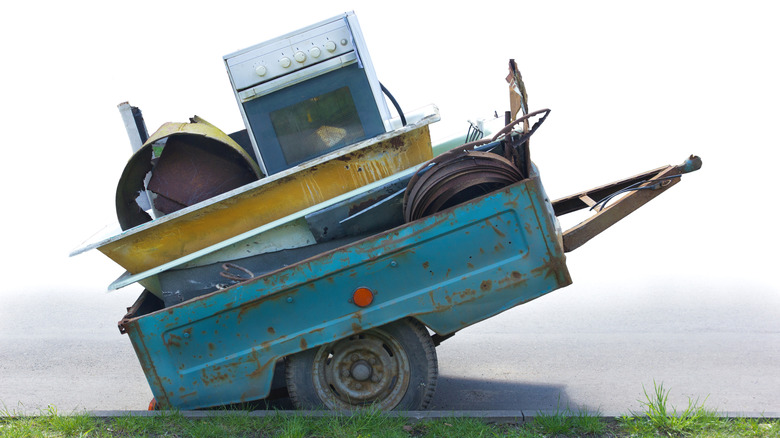The Best Way To Safely Get Rid Of Large Appliances That You No Longer Need
Your old appliance is dead to you. You've killed it. You've done it in spirit, if not literally. It's time to get rid of that bulky dinosaur, but as much as you stare it down and try to talk it into getting rid of itself, you're not happy with the idea of having to pay money to your local landfill for the luxury of getting rid of it. You're thinking there must be a better way.
To be fair, we've all seen refrigerators converted into wine cellars, root cellars, bookshelves, dog houses, and even a couch. But alas, you can't recover all of the creative effort you put into getting rid of large appliances in such a manner, and maybe you want some tips on more conventional recycling solutions that — hopefully — cost less. That's why Hunker spoke with Garret Bergstrom, a Licensed Appliance Repair Technician at Frontdoor, about the challenges of safely ridding yourself of large appliances that you no longer need, and he explained that the process and prices vary by appliance. Disposing of refrigerators, in particular, can be tricky. "Anything with refrigerant will be harder to dispose of or may cost more money," Bergstrom said, "because the refrigerant and compressor oil must be recovered correctly."
Even with refrigerators, though, there are often plenty of options that don't require fees, and per Bergstrom, the biggest misconception people have about appliance disposal is that there's no way around landfill fees. In fact, there are a few crafty solutions.
Here are some appliance disposal options and costs
There are usually ways to dispose of large appliances for free. When Hunker spoke exclusively with Frontdoor appliance expert Garret Bergstrom, he pointed out that many municipalities have events and scheduled pickup dates when they'll even pick up appliances at your curb. He added, "You can also put appliances to the curb after posting on social media (e.g., Facebook Marketplace)," he said, "as scrappers and bargain hunters will often take them off your hands."
And there are even circumstances in which you can get paid for your old appliance. Obviously, you can attempt to sell it on an online marketplace – used appliances are a good way to save -– and make – money. And you can often recoup some of the costs of your replacement appliance by taking advantage of retailer trade-ins. But the best method, Bergstrom explained, is to hand your appliance over to a scrap metal facility. "In reality, many scrap metal facilities will generally take large appliances for free — or in some cases, even pay you a little for dropping them off," he said.
That said, there are situations when you'll have to pay the landfill to get rid of an appliance. And if you're wondering how much that cost actually runs, Bergstrom had some answers. "The fees for recycling or disposing of appliances will change depending on unit size and what local agencies decide to — or need to — charge, usually between $5 and $15 for standard appliances." Appliances like refrigerators and small AC units might require higher fees because refrigerants have to be recovered safely.
What you should know about recycling old appliances instead of junking them
While scrap metal facilities are a reliable way to dispose of appliances without paying a fee, Garret Bergstrom told Hunker when we spoke with him exclusively that it's not necessarily the safest, most environmentally sound approach. "The safest way to dispose of appliances is taking them to a landfill that recycles them," he said. You can, and should, recycle basically everything in your home.
The safer approach might be worth it if you're concerned about environmental impact. Appliances can contain metals, fluids, and refrigerant that should be recovered and recycled. "If there is any material such as refrigerant still in the appliance, the recycle facility will recover it in accordance with EPA standards," Bergstrom explained.
Of course, potentially hazardous materials aren't the only things that can be recycled. The reason scrap yards will handle large appliances is that their component parts, particularly metals, can be sold to recyclers. "Various parts and materials get recycled when these appliances are disposed of properly," Bergstrom said. "For instance, the copper, steel, aluminum, and even circuitry from your old appliances can be recycled."


